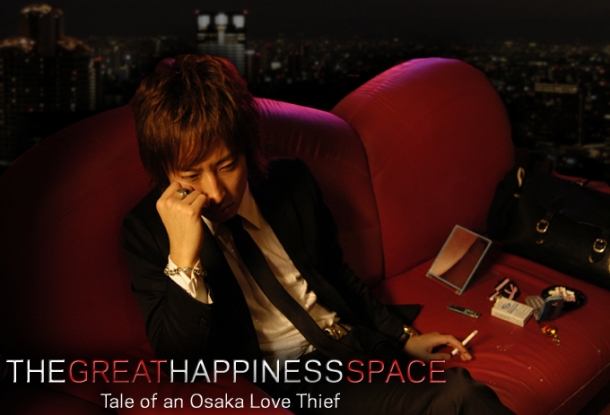The Absence of Therapy
Taking a break from marketing today, I've decided to post links to a documentary and a recent article which make me think -- what went wrong here? What could a therapist "do" here -- if anything?
Both of these stories are a fascinating mix of alcoholism, money, ethics, and quasi-therapeutic situations.
The Great Happiness Space
I saw The Great Happiness Space a few months ago and was blown away by this exploration of Japan's male host club culture. The director, Jake Clennell, paces the film to reveal the story a piece at a time so I won't go into detail here. If you have netflix, you can watch it online.
At St. Paul 'wet house,' liquor can be their life -- and death
While fumbling helplessly on twitter, a tweet from Rand Fishkin caught my eye. I'd never known there were places like "wet houses" -- or hospice for active alcoholics. While the realistic approach, compassionate care and non-judgemental additude in this place is wonderful, the therapist in me is deeply saddened.
Ok, I know I said I was taking a break from marketing but -- I can't help myself.
Let's do a brainstorming exercise.
Say you met one of the individuals featured here in real life, what would be your most persuasive argument to get that person to seek treatment? How could you talk to them without getting immediately tuned out?
What message, if anything, would get through to them?
Could you do it?
Would you want to?




Comments
Heather
Feb 21, 2011
Permalink
I wouldn't try to persuade someone who had made it to a 'wet house' into treatment; I would be happy that they had found stable housing that included food, someone watching out for them and access to adequate medical care. This may sound like a case of lower than reasonable expectations, but I really favor an approach that meets people where they are. There's a huge amount of debate around harm-reduction methods, and I get that some people might look at this approach and see it as either collusion or 'giving up' on people; I actually see it as the opposite. So many addiction programs refuse to work with folks if they're using, and sadly that results in people who really need service not getting any kind of support, leaving them, as the article made reference to, on the street without a friend in the world. I think everyone deserves to have their basic needs met, regardless of what they're struggling with.
leigh
Feb 21, 2011
Permalink
Heather I agree with you. I feel a pang of despair for the guys that are only 30 years old and in a wet house. I'm sad that at this point in civilization that we haven't found better/more effective ways to support each other. That this is reality to so many people is disheartening.
Philadelphia's homeless population is growing. I can't walk 5 blocks without being asked for help at least once. So MANY people need help and I feel like there has to be a better way - as an individual what can I do?
I buy a "One Step Away" paper ( http://www.osaphilly.com/ ) when I see a vendor but there has to be more that can be done.
I think about this issue - not because I want to "fix" any person or class but rather, like you say, everyone deserves to have their basic needs met, to live their life with dignity and I'd like to know how to help.
Heather
Feb 22, 2011
Permalink
I'm so with you on that Leigh! I also wish there was some concrete thing that could be offered, that could be counted on to improve things. I really believe that most of the general population (myself included) feels sort of helpless when confronted with these issues; wanting to help but having no idea how to begin to go about it. I have a few friends who work in the homeless community, and I have to say, it's an area that is often short on optimism (and high on cynicism). I try to focus on small things, outside of my work context, which might seem unimportant but I think do matter, like making eye contact and responding with kindness when people approach (unless it's in the unusual context of a dangerous situation). I was in classes once with a woman who had spent a lot of her adolescence on the street, and she mentioned that- spending most of her time feeling either reviled or invisible. Of course there are a million other things as well- lobbying government, volunteering, donating money to local shelters, etc, but I think smaller interactions matter too.
Denise Stein
Feb 24, 2011
Permalink
Disclaimer: I do not have Netflix; I did not watch the film; only the synopsis, shorts, and reviews I could find for it. That being said, Heather - you have it SO right! It's the everyday, tiny, small acts of kindness or even common courtesy that define a person's existence - both the giver and the recipient. This is true for ALL of us, because what many of us do not want to acknowledge (not just about the the "big sins" of alcoholism, other drug abuse and prostitution - but also about such mundane things as chronic (and especially mental) illness, job loss, deaths of loved one due to depression/suicide - is that "there but for the grace of God, go I" - except that God is US: and it's our grace - every day and in every small way we can - that humankind is depending on to survive. Unfortunately, while many of us talk the talk; few of us (and I include myself here) TRULY walk the walk. I do try to smile and make eye contact; but - like Leigh - what do you do when 5 or 10 people are all literally begging for your last dollar at the same time (never mind the auditory overload that puts on people like me!). I run for the hills. Because I can't help all the people, all the time. BUT, I can put a quarter in a jar if I have one, I can literally give someone who obviously hasn't bathed in weeks the time of day when they ask if I know what time it is; I can offer my unopened water bottle before I get on the train to someone who appears to need it more than I do. There are way too many opportunities to help; and I personally think it's not necessarily apathy (though sometimes it is), but fear, that keeps us from doing the "right thing". Again, my personal philosophy - it starts with education (not in college - but in preschool, not in a building, but on the streets). Maybe I feel so strongly about this because at one time, my own son was 16, strung out on drugs and homeless in another state. The kindness of strangers (to us at that time) saved him. Literally. Do I now not owe my fellow man a cheerful hello and a smile? You bet I do!